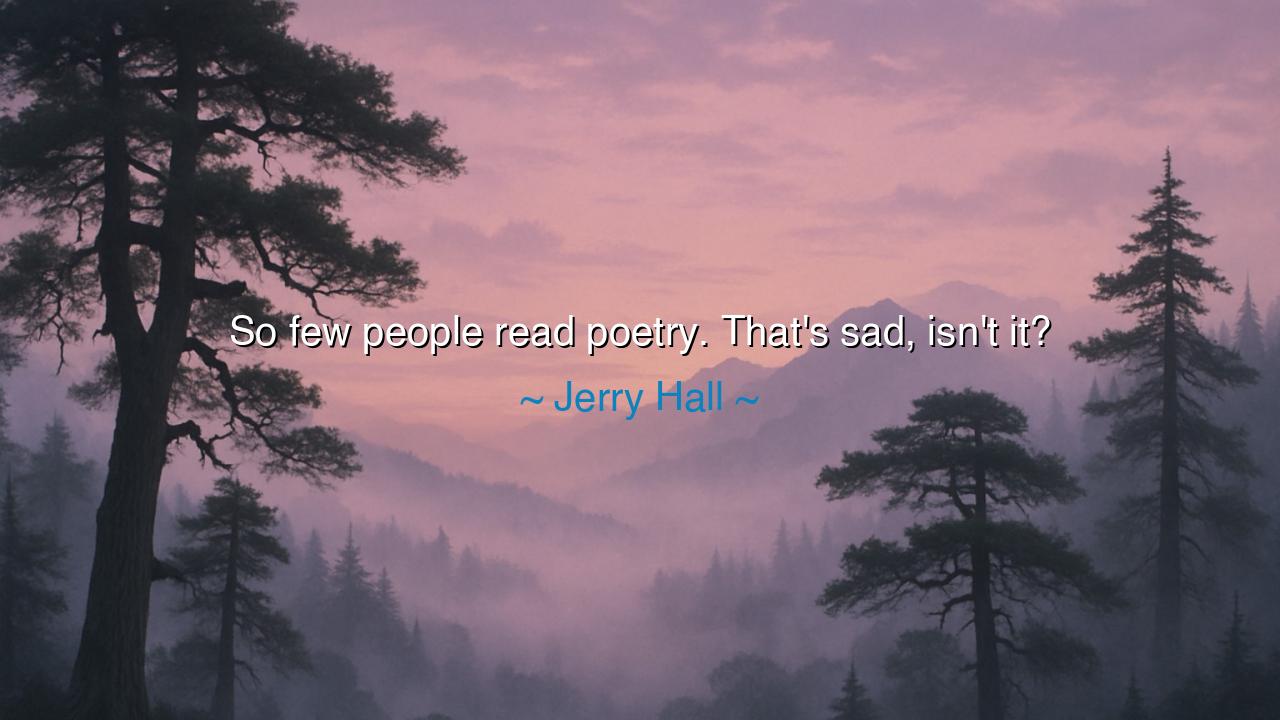
So few people read poetry. That's sad, isn't it?






Hear the lament of Jerry Hall, spoken softly yet heavy with truth: “So few people read poetry. That’s sad, isn’t it?” In these words lies not only sorrow for the decline of an art, but a warning to the soul of humanity. For when a people no longer nourish themselves with poetry, they risk forgetting the rhythms of their own hearts. Poetry is not merely ornament—it is memory, it is music, it is the condensed fire of human spirit, passed down from age to age. To abandon it is to dim the flame of our shared humanity.
The meaning of her words shines in their simplicity. Poetry is the language of depth, the voice of love, grief, wonder, and longing. It distills what prose spreads wide. It transforms the ordinary into the eternal. Yet, in an age where speed and distraction rule, fewer turn to the quiet power of verse. Hall calls this sad because it is a loss not only of beauty but of wisdom, for poetry trains the soul to see beyond surfaces, to hear the hidden music in life.
The ancients knew this well. In Greece, the epic poets Homer and Hesiod were not mere entertainers; they were teachers, historians, and philosophers of the people. The Iliad and the Odyssey were sung before audiences not only to delight them but to shape their identity, to teach them courage, loyalty, and fate. In India, the Mahabharata and the Ramayana carried in verse the great questions of duty, love, and truth. For centuries, entire civilizations were raised on poetry, because they knew that in verse the soul could breathe.
History gives us further proof. During the dark days of World War I, soldiers in the trenches turned to the works of poets like Wilfred Owen and Siegfried Sassoon, whose words captured the horror and the dignity of their struggle. Poetry became their solace, a reminder that even amid chaos, human voices could carve meaning. Imagine if their words had been lost—how much poorer our understanding of that time would be. The sadness Jerry Hall speaks of is this very danger: that future generations may lose the lens through which to interpret both beauty and suffering.
And yet, the decline of poetry is not only in the loss of readership but in the loss of attention. To read poetry demands stillness, patience, reflection—all qualities that grow scarce in an age of haste. Perhaps people turn from it not because they do not care, but because they fear the confrontation with silence and truth it demands. For poetry does not let us escape ourselves; it draws us deeper into our own hearts.
The lesson, O seeker, is this: do not abandon the ancient gift of poetry. Seek it not only in books but in songs, in prayers, in the lines of wisdom your ancestors left behind. Let your mind be stretched by its imagery, let your heart be softened by its rhythms. For in poetry, you will find mirrors of your own soul, and bridges to the souls of others long gone. Without it, the human spirit becomes thin, deprived of one of its oldest nourishments.
Practical is this counsel: set aside time to read a poem each week. Do not rush it; sit with it. Speak it aloud, for the ear awakens what the eye alone cannot grasp. Share it with a friend or child, keeping alive the chain of memory. And if you are bold, write your own verses—not for fame, but for truth. In doing so, you keep the sacred art alive, and you strengthen your own heart.
Thus Jerry Hall’s words echo not merely as complaint, but as warning: “So few people read poetry. That’s sad, isn’t it?” Let us hear her well, and let us not be counted among those who forget. For to keep poetry alive is to keep alive the deepest song of humanity, the song that has always guided us through sorrow and joy, through war and peace, through life and into eternity.






AAdministratorAdministrator
Welcome, honored guests. Please leave a comment, we will respond soon